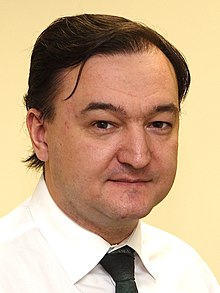Sergei Magnitsky | |
|---|---|
Сергeй Магнитский | |
 Magnitsky in 2006 | |
| Born | 8 April 1972 |
| Died | 16 November 2009 (aged 37) |
| Cause of death | Blunt cranial trauma |
| Resting place | Preobrazhenskoye Cemetery, Moscow, Russia |
| Nationality | Soviet (until 1991) Russian |
| Alma mater | Plekhanov Russian University of Economics |
| Occupation(s) | Lawyer, tax advisor[1] |
| Known for | Inspiring Magnitsky legislation |
| Spouse | Natalia Zharikova |
| Children | 2 |
Sergei Leonidovich Magnitsky (Russian: Сергeй Леонидович Магнитский, pronounced [sʲɪrˈɡʲej lʲɪɐˈnʲidəvʲɪtɕ mɐɡˈnʲitskʲɪj]; Ukrainian: Сергій Леонідович Магнітський; 8 April 1972 – 16 November 2009) was a Russian lawyer and tax advisor responsible for exposing corruption and misconduct by Russian government officials while representing client Hermitage Capital Management.[1] His arrest in 2008 and subsequent death after eleven months in police custody generated international attention and triggered both official and unofficial inquiries into allegations of fraud, theft and human rights violations in Russia.[2][3][4] His posthumous trial was the first in the Russian Federation.
Magnitsky alleged there had been large-scale theft from the Russian state, sanctioned and carried out by Russian officials. He was arrested and eventually died in prison seven days before the expiration of the one-year term during which he could be legally held without trial.[5][6] In total, Magnitsky served 358 days in Moscow's Butyrka prison. He developed gall stones, pancreatitis, and a blocked gall bladder, and was denied medical care. A human rights council set up by the Kremlin found that he had been physically assaulted shortly before his death.[7][8] His case became an international cause célèbre.[9]
The United States Congress and President Barack Obama enacted the Magnitsky Act at the end of 2012, barring those Russian officials believed to be involved in Magnitsky's death from entering the United States or using its banking system. In response, Russia condemned the Act and claimed Magnitsky was guilty of crimes.[10] Nearly a dozen other nations, as well as the European Union, have subsequently implemented or considered Magnitsky legislation.
In early January 2013, the Financial Times wrote that "the Magnitsky case is egregious, well documented and encapsulates the darker side of Putinism".[11]
- ^ a b "How Bill Browder Became Russia's Most Wanted Man". The New Yorker. 13 August 2018. Retrieved 5 May 2019.
- ^ "Russia 'is now a criminal state', says Bill Browder". BBC. 23 November 2009. Retrieved 27 December 2009.
- ^ Browder, Bill (2015). Red Notice: How I Became Putin's No. 1 Enemy. Transworld Digital. ISBN 978-0593072950.
- ^ Nicola Lombardozzi (20 November 2014). "I quaderni del carcere di chi sfidò lo zar Putin". la Repubblica (in Italian). p. 53.
- ^ Aldrick, Philip (19 November 2009). "Russia refuses autopsy for anti-corruption lawyer". The Daily Telegraph. London. Retrieved 27 December 2009.
- ^ Inside the Largest Tax Fraud Case in Russian History, 22 March 2021, archived from the original on 15 December 2021, retrieved 23 March 2021
- ^ Kathy Lally (20 January 2011). "UN-appointed Human Rights Experts to Probe Death of Russian Lawyer Magnitsky". The Washington Post. Retrieved 27 February 2011.
- ^ Walker, Shaun (19 March 2013). "Russia drops inquiry into death of Sergei Magnitsky". Moscow. Retrieved 5 April 2013.
- ^ "Dying in Agony: His Reward for Solving a $230 Million Fraud". The Sunday Times. 14 November 2010.
- ^ Higham, Scott; Hudson, Michael; Guevara, Marina Walker (6 April 2013). "Piercing the secrecy of offshore tax havens". Washington Post.
- ^ "A Magnitsky law for Europe". The Financial Times. 3 January 2013. Retrieved 5 January 2013. p. 8.